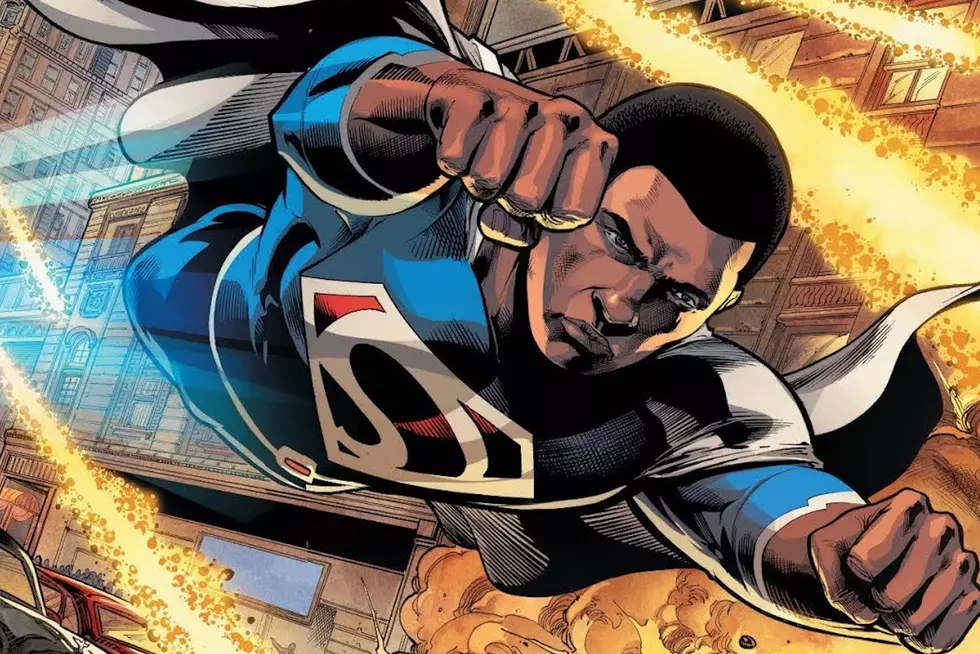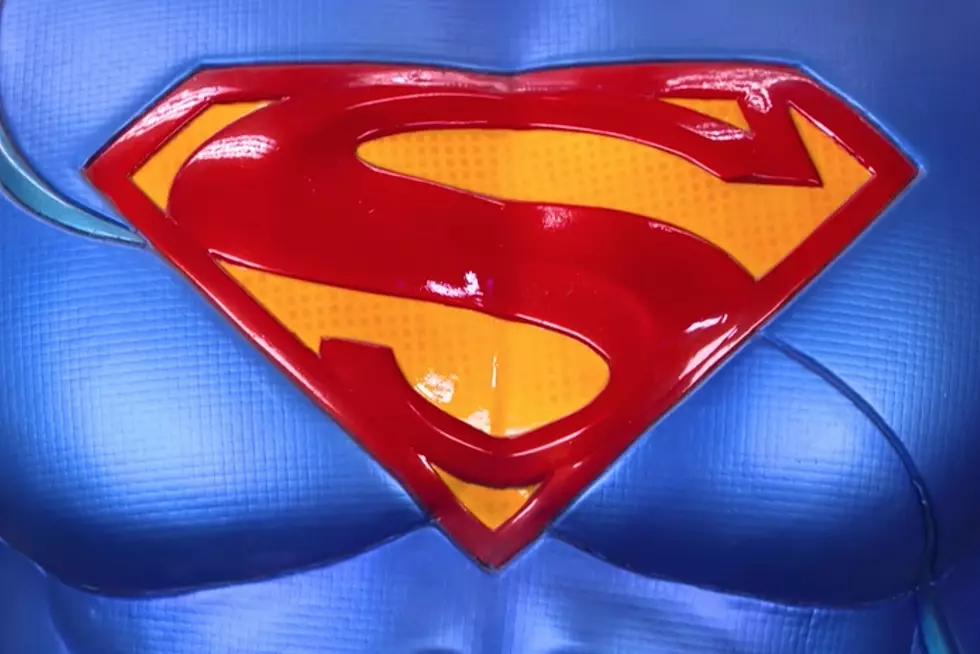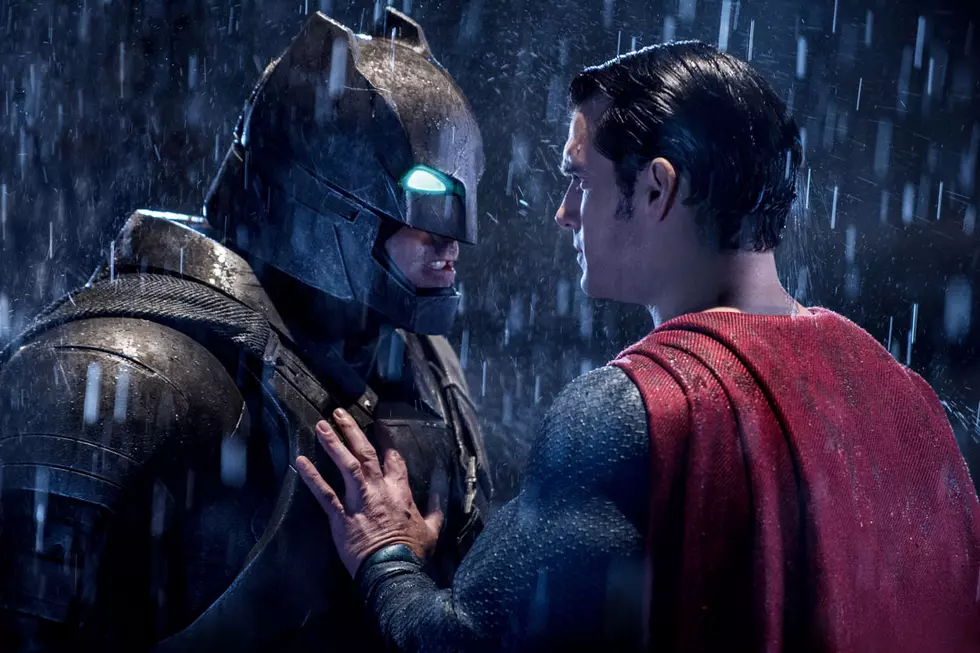![Alan Moore On Superman Creators Siegel And Shuster’s Plight In ‘Occupy Comics’ #2 [Essay Excerpt]](http://townsquare.media/site/622/files/2013/06/untitled-1-1371238783.jpg?w=980&q=75)
Alan Moore On Superman Creators Siegel And Shuster’s Plight In ‘Occupy Comics’ #2 [Essay Excerpt]

The legendary and outspoken writer behind Watchmen, V for Vendetta, From Hell, and many more of the most memorable comic book stories of the last 30+ years, Alan Moore's feelings on creators' rights are well documented. He's continued to discuss his views at length in Occupy Comics, Black Mask Studios' Kickstarter-funded anthology inspired by the Occupy Wall Street movement, opining mainly on the comics industry's complex historical relationship with counterculture and corporations. Titled "Buster Brown At The Barricades," much of the latest chapter focuses specifically on Superman creators Jerry Siegel and Joe Shuster, and their lifelong struggle for credit and control of the Man of Steel they created and sold for just $130 in the 1930s.
No matter your feelings on Moore himself or the Siegel/Shuster legal battles with DC Comics (which seemed to had come to a definitive end recently), Moore's written a thoughtful essay that's well worth your time, particularly as fandom celebrates the 75th anniversary of Superman's initial publication and the release of the new Man of Steel film. The first chapter is available in Occupy Comics #1 and on Wired.com. To promote the upcoming second issue, Black Mask Studios distributed the following lengthy excerpt of Moore's second chapter, which you can check out below.
Reportedly finagled from Siegel and Shuster's unsuspecting grasp when the two young men were called up to fight in World War II, their character precipitated a tsunami of costumed or masked adventurers amidst which Superman would gradually become almost completely unremarkable. However, given the predominance that Superman and the entire genre which followed him would in the end achieve, a closer look at the initial presentation would seem to be called for. Almost certainly by instinct rather than by psycho-social analysis, two Cleveland teenagers had crafted a near-perfect and iconic fantasy which spoke to something deeply rooted in the psyche of working America: propelled to Earth (and, more specifically, America) from an exploded home-world during infancy, the character, like many of his readers or their parents, was an immigrant. Then there's the usually-unexamined matter of his humble rural upbringing, a far cry from the throng of wealthy socialites, arms manufacturers, doctors and scientists who would provide respectable and largely middle-class civilian alter-egos for the cape-clad multitude that followed hot on Superman's red-booted heels.
At his inception, Superman seems very much a representative of the downtrodden working classes his creators hailed from, and a wonderful embodiment of all the dreams and aspirations of the powerless. Dressed in bright primaries where most of his Depression-era readers were confined to threadbare black, or brown or grey, here was a character that in a single bound could leap above the worn-out city streets which his impoverished countrymen were forced to trudge in search of work. While the ensuing decades and expanding fortunes of America have seen Siegel and Shuster's purloined champion recast as an establishment ideal, a figure that embodies tactical superiority and thus perhaps a sense of national impunity, the archetypal superhero at his outset was a very different proposition. In his earliest adventures, with an admirably broadminded definition of what constituted criminality, a splendidly egalitarian Man of Tomorrow would rough up strike-breakers and use his super-strength to hurl unscrupulous slum landlords over the horizon. Gradually across the next few years, perhaps in keeping with the Cleveland pair's decreasing power to control their own creation, Superman would undergo a moral and political makeover to become a bastion of authority, carefully trimmed of any prickly or non-conformist attitudes.
This same trajectory is to be seen in many of America's pop-culture icons, such as the initially demonic and yet rapidly suburbanised form of Walt Disney's Mickey Mouse. If, as suggested earlier, American identity first bonded and solidified around the nation's entertainment industries, we can perhaps see why this taming process was considered necessary. Symbols which enshrined America's emergent image of itself were simply too important socially to be left in the hands of unpredictable and sometimes idealistic individuals such as their creators. Clearly, it was seen as more appropriate for these new U.S. totem entities to be in the possession and safekeeping of frequently questionable businessmen rather than that of the genuinely talented and decent human beings who'd originated them. Given that Superman had been rebranded as exemplifying Truth, Justice and the American Way, it seems ironic that the first two of these qualities had been so casually dispensed with, while to judge from the behaviour of the nascent comics industry it would appear that their interpretation of 'the American Way' had little to distinguish it from any other forms of spineless underhand deception, larceny or bullying.

According to Craig Yoe in his book Secret Identity: The Fetish Art of Superman's Co-Creator Joe Shuster, Superman co-creator Joe Shuster anonymously illustrated likenesses of his Superman characters being beaten and tortured in the fetish comic book series "Nights of Horror" after he and co-creator Siegel lost rights to Superman and its related characters. Many believe these illustrations channel Shuster's rage at losing his creations. 1950s.The industry's apologists have offered various glosses for the shameful act of theft upon which the vast business that supports them seems to have been founded. One of the more despicable of these constructions has it that Siegel and Shuster should have been more shrewd in signing contracts, which appears to be a variant on the well-known American proverbial advice regarding suckers and the inadvisability of giving them an even break. More lately there have been attempts to mitigate the industry's offence with an appeal to half-baked mysticism and postmodernism, maintaining that Superman and the commercial children's comic characters which followed him are all in some sense archetypes that hover in the ether, waiting to be plucked by any lucky idiot who passes by. Ingeniously, this sidesteps the whole Siegel and Shuster problem by insisting that creators in the superhero field aren't actually creators after all, but merely the recipients of some kind of transcendent windfall fruit that should be freely shared around. Even if this were true, it's difficult to see exactly how it justifies a perhaps gangster-founded company of fruiterers (just to continue the analogy) declaring that these profitable magic apples all belong to them in perpetuity. Still, one can see why such a morally-evasive brand of metaphysics might appeal to the large corporate concerns which steer the comic industry; to those amongst the readership whose primary allegiance is to a specific superhero rather than the ordinary non-invulnerable human who originated him; and to those loyally and profitably labouring at franchises, who know they're in no danger of ever creating an original idea which would be valuable enough to steal. Alternatively, those not found in the preceding factions might question the wisdom of erecting such an important commercial and ideological endeavour on foundations so blatantly rotten and so lacking in the necessary load-bearing integrity.

[related excerpt from Part 4]
Unfortunately, being seemingly reluctant or incapable of altering the seamy and disreputable practices of comics past, the publishers were raising their immaculate new edifice upon foundations that were riddled with decay. Despite the fact that the array of publishers and editors who steered the comic industry did not themselves appear to possess any noticeable talents save for cheating the more gifted out of their creations, hustling, and otherwise accumulating money; and despite the fact that lacking an exploitable parade of artists, writers, and just generally creative individuals the entire industry, the superhero, and the new house that the publisher just bought would not exist; despite these things the comics business would continue to routinely bully, cheat , abuse, and alienate the very people on whom it depended. Comic book concerns and businesses, gangster initiated, casually applied the values and techniques of their illustrious founders, treating their creators with a breathtaking contempt as if they saw the men and women who had made their fortunes as plantation slaves or some variety of fuel-rod, endlessly replaceable and therefore instantly disposable. Regrettably, a sizeable proportion of the industry's creative individuals would seem to have internalised this image of themselves, perhaps through lack of confidence in their marketability without the proven lure of the established superhero franchises which they are working on, and have remained content in uncomplaining loyal servitude until age compromises their abilities and they're inevitably cast aside by their employers.
Amidst the vast multitude of cowed, intimated workers on the comic book assembly line, only those rare creators with a sense of their own worth have ever actively defied or walked away from their tormentors. Unsurprisingly, these turn out to be by and large the same creators who have done most to enrich the comic world. Siegel and Shuster, from a very early stage, were public in their anger over having been deceived and cheated out of Superman and its related properties, though it was not until the groundswell of publicity surrounding the first Superman film in the 1970s that, largely through the tireless work of, arguably, the real Batman co-creator Jerry Robinson, D.C. were shamed into allowing Jerry Siegel and Joe Shuster a small pension as a thank-you for creating the whole superhero industry. That this begrudging stipend was inadequate is evidenced by the long-running lawsuit which Siegel and Shuster's families have served upon D.C., a lawsuit one suspects to be the reason why a television show that could quite reasonably be expected to be titled Superboy has instead aired as Smallville. It is safe to say that many of D.C.'s revamping efforts with the character, along with their apparently coincidental drastic overhauls of continuity, are predicated not on any true creative reasons but upon the possibility of losing ownership of certain concepts, brands or characters in an ongoing legal battle that is only now approaching its hopefully just conclusion.
Superman's creators, obviously, aren't the only talents in the comic business to have raised objections to their treatment. In what can be seen as both an admirably heartfelt and almost poetic statement, the creator of the 1940s Human Torch and thus of the first Timely/Marvel superhero character, Carl Burgos, took his comic book originals out onto his front lawn and torched the lot of them. By the middle-to-late-1960s both Steve Ditko and Jack Kirby, tired of being kicked around by Marvel after all that those two legends had done to create the company, jumped ship and went instead to work at Charlton or eventually D.C., where one suspects that they fared little better. In Jack Kirby's case, as with Siegel and Shuster, Kirby's family are engaged in an ongoing legal contretemps with Marvel Comics over ownership of all the characters that Kirby undeniably created. Given that no-one at Marvel Comics wants to contemplate what all its movie franchises would look like with the Kirby characters removed, it may well be imagined that the full might of their law department has been marshalled to prevent this nightmarish scenario from occurring.

For the entirety of this chapter of Moore's essay, be sure to pick up Occupy Comics #2, on sale June 19 from Black Mask Studios.
More From ComicsAlliance









